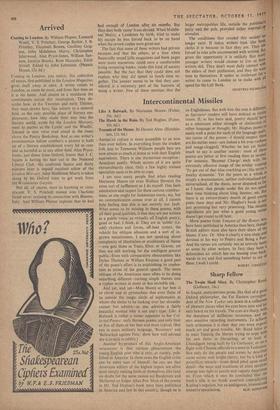Arrived
Coming to London. By William Plorner, Leonard Woolf, V. S. Pritchett, George Barker, J. B. Priestley, Elizabeth Bowen, Geoffrey Grig- son, John Middleton Murry, Christopher Isherwood, Alan Pryce-J ones, William San- som, Jocelyn Brooke, Rose Macaulay, Edith Sitwell. Edited by John Lehmann. (Phceniit House, 12s. 6d.) Coming to London, you notice; this collection of essays, first published in the London Magazine, gives itself away at once. A writer comes to London, as come he, must; and from that time on it is his home. And almost to a mandarin the contributors accept this assumption. They de- scribe how, in the Twenties and early Thirties, they were drawn here, like miners to a mineral field, as the only possible place of literary em- ployment; how they made their way into the literary world, wrote for the London Mercury, went to parties at the Lynds' and the Woolfs', listened to new verse read aloud in the room above the Poetry Bookshop. And as one writer's reminiscences follow another's a picture is built up of a literary establishment every bit as cosy and as harmful as in any other field. Alan Pryce- Jones, just down from Oxford,, learns that J. C. Squire is having, his hair cut in 'the National Liberal Club. He confronts Squire and thirty minutes later is tinpaid assistant editor of the London Mercury. John Middleton Murry is taken along bY his Oxford tutor to get work from the' Westminster Gazette.
Not all, of coUrse, were -as knowing 'or com- placent. V. S. Pritchett moved into Charlotte Street never realising its connection with Blooms- bury. And William Plomer explains that he had
had ,enough of London after six months. But then they both 'came' from abroad. Wheti Middle- ton Murry, a Londoner by birth, tried to make his escape he was forced back to be on 'hand when the review copies were given out.
The fact that some of these writers had private incomes and 'that the others, at a time when financially sound' little magazines and book pages were more numerous, could earn• a comfortable living reviewing books, made this kind of society possible. But the fact that they could does nbt explain why they did spend so much time to- gether. The answer seems to be that they con- sidered it a necessary part of the business of being a writer. Few of them mention that the
larger metropolitan life, outside the publisher s party and the pub, provided either material ,or stimulus.
The conditions that created this society' nn longer exist. If today writers look like hank clerks it is because in fact they are. They are forced to take jobs unconnected with writing. But given the opportunity it is unlikely that manY younger writers would choose to live as these writers did. They don't want daily contact with the elders of their profession, and they do want time to themselves. It seems as irrelevant for a writer to come to London as to make with all speed for the Left Bank. GEOFFREY NICHOLSON


































 Previous page
Previous page